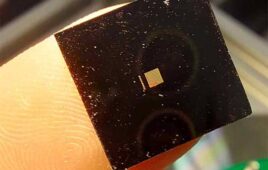 Regenerative technology company StimLabs has enrolled the first patient in a clinical trial using shelf-stable placental tissue to reduce complications following herniated disc surgery.
Regenerative technology company StimLabs has enrolled the first patient in a clinical trial using shelf-stable placental tissue to reduce complications following herniated disc surgery.
The multi-center, randomized controlled trial will evaluate the safety and efficacy of Revita, StimLabs’ full-thickness placental allograft, which surgeons will place following lumbar microdiscectomy procedures. Microdiscectomy is a common, minimally invasive procedure to remove the herniated or protruding portion of the intervertebral disc that is compressing the traversing spinal nerve root. Common post-surgical complications include scar tissue formation and reherniation.
Roswell, Ga.–based StimLabs designed Revita to reduce the rate of back and leg pain and improve functional outcomes, the company said in a statement.
StimLabs uses a proprietary process to preserve all three layers of donated placental tissue to maintain the physiologic 3D architecture of the natural barrier membrane. The process captures native placental proteins, growth factors, and glycoproteins. The processed, full-thickness membrane is presented in dehydrated form, cut into various sizes, and terminally sterilized according to FDA standards and American Association of Tissue Banks requirements. The processed tissue may also be used for wound care, orthopedics, urology, plastic and general surgery, OB/GYN procedures, ophthalmology and dental procedures, according to the company.
StimLabs hopes to enroll 182 patients between 18 and 70 years of age in the study. Ninety-one will receiving the Revita allograft as a barrier membrane and the control group will have the current standard of care. The Oswestry Disability Index (ODI) and a 12-Item Short Form Survey (SF-12) will be used to quantitatively evaluate back and leg pain post-procedure. The study will also evaluate the rate of reherniation in both the treatment and control groups.




